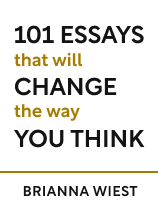

This article is an excerpt from the Shortform book guide to "101 Essays That Will Change the Way You Think" by Brianna Wiest. Shortform has the world's best summaries and analyses of books you should be reading.
Like this article? Sign up for a free trial here .
What is Brianna Wiest’s 101 Essays That Will Change the Way You Think about? What is the key message to take away from the book?
In 101 Essays That Will Change the Way You Think, Brianna Wiest explores the interplay between your thoughts, your perceptions, and the way you experience life. She explains how your thoughts influence the way you interpret life, why it’s so hard to control how you think, and what you can do to manage your thoughts and feelings about yourself and your experiences.
Below is a brief overview of 101 Essays That Will Change the Way You Think by Brianna Wiest.
101 Essays That Will Change the Way You Think
When we don’t feel good, we often assume that our circumstances are at fault and that we must change them to improve the way we feel. But, what if we’re going about this the wrong way?
This guide presents Brianna Wiest’s 101 Essays key takeaways, which we’ve organized into four parts:
- Part #1 explains how your thoughts and feelings influence how you interpret your experiences.
- Part #2 explores how social conditioning influences the way you unconsciously think about yourself, other people, and your experiences.
- Part #3 clarifies how you’ve been conditioned to ignore your own needs and instead seek external validation.
- Part #4 presents methods to help you become more conscious of your thoughts so that you can learn to take control of them and improve the way that you feel.
Part #1: Your Thoughts Determine How You Interpret Everything
Wiest argues that the only way to change the way you feel about the people and things that make you feel bad is to change the way you think about them. To understand her argument, you first need to grasp one key idea: There’s no such thing as an objective experience—meaning that there’s no one “right” way to interpret your experiences.
Wiest explains that no experience has inherent qualities of its own—such as being good, bad, right, or wrong. You only assign these values to them because of the way you think about and interpret them. Therefore, it’s not your experiences that determine how you feel, but your thoughts about these experiences.
Feedback Loops Reinforce Your Thoughts and Feelings
Additionally, Wiest argues that it’s difficult to change the way you think and feel about what happens to you. This is because your thinking patterns lock you into a feedback loop that reinforces the way you interpret your experiences.
The following five-step process illustrates how feedback loops reinforce your thoughts and feelings:
- Your state of mind influences what types of thoughts you have. For example, you’re experiencing stress so you have worrisome thoughts.
- Those thoughts influence the way you feel. Your worrisome thoughts make you feel anxious and this increases your stress levels.
- Your feelings determine what you pay attention to. Your feelings of anxiety compel you to focus disproportionately on things that are going wrong in your life. As a result, you engage in more worrisome thoughts and further increase your stress levels.
- What you pay attention to determines how you interpret and judge your experiences. Your focus on what’s going wrong in your life leads you to judge your experiences as difficult or problematic—because it blocks you from perceiving what’s going well in your life.
- Your judgments reinforce how you feel, what you think, and your state of mind. Because you’re judging your experiences as problematic, you continue to feel anxious and you believe that you have a reason to experience stress. As a result, you continue to interpret everything that happens from this negative perspective.
Your Thoughts Shape Your View of the Past and Future
Wiest claims that this process of interpretation isn’t limited to the present moment. Your thoughts also impact the way you experience memories of the past or expectations for the future—because you project your current state of mind onto whatever you think about. This explains why your feelings about the past or future often fluctuate depending on your current mood.
(Shortform note: The psychological term “mood-congruency” explains why memories and expectations change according to your mood. You rely on your imagination to construct your memories and expectations. However, your emotions and imagination are inextricably linked—meaning that your current emotions determine the emotional content of your recollections or expectations.)
Part #2: You’re Not Conscious of Your Thoughts or Why You Think Them
Since everything you experience is simply a reflection of the way you think, it follows then, that to experience things differently, you just need to change your thoughts. However, Wiest argues, before you can change your thoughts, you first need to become conscious of them and understand why you currently think the way that you do. In this second part of the guide, we’ll explain why you don’t have complete autonomy over the way you think and how this impacts the way you interpret your experiences, how you experience happiness, and how you judge yourself.
(Shortform note: Many self-help practitioners agree that understanding why you think the way that you do is the key to changing your thoughts. Without this understanding, you’re more likely to believe that your thoughts are entirely rational (because your experiences justify your thoughts), and you won’t feel motivated to change the way that you think about or interpret your experiences.)
You Subconsciously Think Like Others To Feel Happy
While you might believe that you consciously control your thoughts, Wiest claims that you’re often not conscious of your thoughts or why you think them. This is because you never consciously chose the thoughts you habitually think or the beliefs that reinforce them. Rather, you subconsciously adopted the thoughts and beliefs of your family, your friends, and your culture.
According to Wiest, these adopted thoughts and beliefs influence your entire worldview—how you judge the world, your place in it, and the circumstances you face. In other words, everything you’ve ever thought of as good, bad, right, wrong, beautiful, or ugly has simply been a reflection of the way other people have influenced you.
Why would you adopt the thoughts of those around you? According to Wiest, you likely found early on in life that it was the only way you could experience comfort and happiness. She explains that, as a child, your comfort and happiness depended on conforming to the expectations of other people:
- If you acted according to their desires and expectations, you were rewarded—for example, with extra attention and affection. This made you feel comfortable and happy.
- If you acted against their desires and expectations, you were punished—for example, with rejection or social humiliation. This made you feel uncomfortable and unhappy.
(Shortform note: Researchers confirm that we unconsciously internalize the unspoken rules and biases of our social groups so that we can instinctively cooperate with others. Our inherent need to feel connected to others and to avoid punishment motivates us to adopt these rules. In addition, this need for connection encourages us to spend time with people who are similar to us—the feeling of sameness enhances our sense of belonging. However, being around like-minded people makes it difficult to think differently—because surrounding ourselves with people who believe the same things we’ve been conditioned to believe reinforces our thinking patterns.)
Your Happiness Depends on Making Others Happy
Wiest claims that your early experiences conditioned you to believe that you could only ever be comfortable and happy as long as you acted in a way that conformed to what other people wanted and expected from you—in other words, you could only be happy if you made other people happy.
And, to successfully act out your part, you learned to think and interpret the world in the same way that the people you relied on for your comfort and happiness did. The following example illustrates how you were conditioned to adopt other people’s thoughts and interpretations:
- You noticed that your teacher gave you a gold star and a smile when you got perfect grades, and a red cross coupled with a stern look when you performed poorly. Your teacher’s responses to you taught you how to interpret your grades: Perfect grades and gold stars are “good” because they make your teacher happy. And when she’s happy, she smiles at you. Because you felt happier when your teacher smiled at you, you subconsciously associated getting perfect grades with feeling happy. On the other hand, because your teacher’s stern looks made you aware of how unhappy she was, you felt uncomfortable and associated making mistakes with feeling unhappy.
You Rely on External Validation to Feel Happy
In addition to influencing how you think about the world, social conditioning also influences the way you think and feel about yourself. According to Wiest, your feelings of comfort and happiness are so inextricably linked to how other people react to you that you feel compelled to think about yourself according to how you imagine other people perceive you. She explains it as follows:
- You subconsciously assume that your happiness depends on how other people react to you: When you get positive feedback, you evaluate yourself positively and this makes you happy. When you get negative feedback, you evaluate yourself negatively and this makes you unhappy.
- You only evaluate yourself positively when you believe that others think you deserve positive feedback and reward you accordingly. For example, if your teacher gives you a red cross, you don’t evaluate yourself positively and don’t feel happy, because your teacher thought you didn’t deserve a gold star. On the other hand, receiving a gold star makes you feel happy because it proves that your teacher is pleased with you.
- Because you want to be happy, you manipulate the way you project yourself to invite more positive feedback. This involves making yourself appear more pleasing or impressive—for example, by suppressing supposedly unappealing parts of your personality or chasing status goals to appear more accomplished.
You’re Always Focused on Your Inadequacies
Wiest argues that this preoccupation with others’ perception of you makes it impossible for you to ever feel comfortable and happy with yourself—because it compels you to second-guess everything you do and to negatively judge yourself whenever you get unwanted feedback.
She argues that attempting to please or impress others never makes you feel truly happy for two reasons: First, different people want different things, so it’s impossible for you to please everyone. Second, you can never really know what people think about you—the best you can do is make a guess and hope that you’ll manage to elicit the feedback you crave.
Inevitably then, you often fail to receive the feedback you want. And, each time you fail, you assume that it’s because you’re inadequate in some way—if other people don’t feel you deserve their positive feedback, then you won’t believe you deserve it.
You then strive to resolve this by attempting to fix what’s “wrong” with you—hoping that this fix will invite positive feedback. The following example demonstrates how this plays out:
- Your lover won’t commit to you. You assume that he doesn’t think you’re worth committing to, and not worthy of love. You try to figure out why he doesn’t think you’re worthy of love: Because you’re too needy? Or maybe it’s because you’re too fat? In the next relationship, you’ll try to make your partner believe that you’re worthy of love by acting more aloof and going on a strict diet. You think this will make him want to commit to you—and prove (to you) that you are worthy of love and that you do deserve to be happy.
Part #3: Chasing Validation Makes You Unhappy
We’ve just explained how the mental associations you unconsciously formed as a child compel you to engage in two unhealthy thought patterns:
- Interpreting others’ responses to you as an indication of how happy you deserve to be
- Continually looking for ways to fix yourself so that you can elicit positive feedback—and thus feel more deserving of happiness
According to Wiest, relying on positive feedback to feel happy creates a breeding ground for unwanted experiences and negative feelings. This is because seeking validation compels you to engage in two habits that disconnect you from your true needs and make you feel powerless to change your emotions: suppressing your feelings and pursuing the wrong goals.
Let’s explore how these two habits contribute to unwanted experiences and feelings of powerlessness in more detail.
Negative Habit #1: You Suppress Your Feelings
According to Wiest, your conditioning inadvertently taught you to believe that some feelings are unacceptable or bad. As a result, you feel ashamed each time these feelings come up, pretend that you don’t feel them, and try to avoid people and situations that might trigger them. You also judge other people who express these feelings as “bad” or “wrong.”
However, these suppressed feelings continue to live on inside you, get stronger the more you try to deny them, and morph into irrational thought patterns and emotional reactions that stifle your capacity to feel positive emotions.
Example: Suppressed Feelings Lead to Irrational Thoughts and Emotions
You used to get punished for having tantrums as a child. Your tantrums were your way of expressing disagreement with something that you were expected to do. Therefore, you unconsciously associated expressing disagreement with punishment and labeled disagreement as “bad” or “wrong” in your mind.
Though unconscious, this mental association now shapes the way you think about and react to various situations and contributes to many of your unwanted feelings. This is because it leads to a number of unhealthy behaviors and thought patterns, such as:
You pretend to agree with others: Because you want to get along with others and receive positive feedback, you avoid disagreeing with them—either by pretending to take their side or staying quiet. However, the more you avoid expressing your true opinions, the more insecure you feel in your relationships—you never know if people like you for who you are or because you’re validating their opinions.
You agree to things that you don’t want to do: Even though this approach garners positive feedback, doing things you don’t want to do often makes you feel angry and resentful. However, because you’re unable to acknowledge how your own thought patterns created these unwanted situations, you mistakenly assume that other people are making you do things that you don’t want to do. This leads you to conclude that other people are to blame for your negative feelings. As a result, you don’t feel accountable for your role in these unwanted situations and you believe that you’re powerless to change them.
You judge people who do express their disagreement: Because you believe that expressing disagreement is “bad” or “wrong,” you automatically dislike or feel uncomfortable around people who do express their disagreement. Instead of questioning why you feel this way, you assume that your opinion is valid and that they should change the way they act to make you feel better.
Negative Habit #2: You Pursue the Wrong Goals
Wiest argues that your reliance on positive feedback compels you to focus more on how you’re perceived by others and less on how you really feel. She explains that your preoccupation with appealing to others makes you unhappy due to the following reasons:
- It motivates many of your decisions and goals—meaning that you spend most of your energy doing things to please or impress others. For example, you wanted to be a nurse but your parents wanted you to become a neurosurgeon because it sounded more impressive to them. So, you dedicated years of extra training to become a neurosurgeon instead of pursuing your desired path.
- It prevents you from thinking about what your unique needs are and what you need to feel satisfied and happy—meaning that you spend a lot of energy doing things that don’t satisfy you or make you happy. For example, being a neurosurgeon leaves you joyless and unfulfilled, but you won’t quit because you fear losing the admiration you’ve worked so hard to attain.
Achieving Wrong Goals Makes You Feel Unfulfilled
Why would you make decisions and choose goals that waste your energy and make you unhappy? According to Wiest, it’s because you believe that happiness comes from having a life that appears perfect to others—and you make decisions and set goals to achieve your vision of this ideal life.
However, Wiest argues, your vision of an ideal life is simply a response to the way that you’ve been conditioned to please others. Unfortunately, conforming to what others want rarely satisfies your true emotional needs. Instead, it leaves you unhappy and unfulfilled and puts you in a never-ending cycle of “improving” and changing yourself to please those around you.
Further, because this conditioning is so deeply ingrained in you, you fail to question why your achievements aren’t making you happy. Instead, you assume that you just haven’t done enough to deserve happiness and that you need to be, do, or acquire something more—for example, by making yourself more attractive, acquiring more possessions, or achieving a higher status.
Consequence: You Feel Powerless to Change Your Emotions
Wiest argues that suppressing your feelings and pursuing the wrong goals makes you believe that you’re powerless to change the way you feel about your experiences. As we’ve already explored, you’ve been conditioned to put your thoughts and emotions at the mercy of things outside of your control. When other people don’t give you the feedback you depend on to feel happy, or your experiences fail to live up to your ideal vision of happiness, you feel disappointed and unhappy.
Because you’ve given these external factors so much power over your happiness, you mistakenly assume that they are responsible for your happiness. And, since you’ve ceded so much responsibility for your happiness to forces you believe to be outside your control, you feel you are powerless and without agency to take responsibility for how you think and feel.
Part #4: Think for Yourself
We’ve just discussed how social conditioning influences you to think and behave in ways that leave you feeling unhappy and powerless to change your feelings. In this final part of the guide, we’ll explore ways to become more conscious of your thoughts so that you can take better control of them and improve the way you feel.
Wiest argues that, though your conditioning is pervasive, you can overcome it, learn to think for yourself, and feel better about yourself and your experiences. She suggests four methods to help you achieve this.
Method #1: Take Responsibility for Your Thoughts and Emotions
According to Wiest, before you can effectively take control of your thoughts and emotions, you first need to acknowledge that you’re the only one responsible for them. Recognizing this fact encourages you to:
- Understand how your thoughts influence the way you interpret and feel about your experiences.
- Realize when you’re giving control of your thoughts and feelings to things outside of you—for example, when you credit or blame other people or situations for your emotions.
- Explore ways to think differently about the people and things that make you feel bad—because you know that’s the only way to improve the way you feel about them.
- Make conscious decisions that align with your needs and encourage you to feel good about yourself. For example, refusing to attend social events that you have no interest in gives you more time to pursue things that you’re genuinely interested in.
Method #2: Focus on Your Feelings to Define Your Needs
According to Wiest, thinking for yourself requires getting to know yourself. This involves paying constant attention to how you feel so that you can discover who you are and what you need to feel happy. Wiest explains that the more aware you are of your feelings, the easier you find it to challenge and replace the thoughts and behaviors that contribute to your unwanted feelings.
How can you develop an awareness of how your thoughts create your feelings? Wiest suggests that being mindful will help you to shift your focus from the external (other people, your circumstances) to the internal (your feelings). This, in turn, will help you separate how you feel about yourself from how you imagine other people think about you. As a result, you’ll be able to think more clearly about what’s important to you and what you need to feel happy.
Method #3: Assess Your Current Opinions and Beliefs
According to Wiest, an important step in learning to think for yourself is assessing whether your current opinions and beliefs align with who you really are, or if they only exist to please or impress others. She suggests that you can dissect each of your opinions and beliefs by asking yourself the following four questions:
- When was the first time you came across this idea? For example, you believe that people should not make mistakes. You remember overhearing your parents punishing one of your siblings for making errors on a spelling test.
- How does this idea influence your judgment of yourself, other people, and your experiences? Your belief that people should not make mistakes compels you to be overly critical of yourself and others. It also makes you feel resentful of the experiences that don’t live up to your perfect standards.
- How might adopting opposing ideas impact you? If instead, you choose to believe that it’s okay to make mistakes, you might find it easier to accept and forgive yourself and others for making mistakes. You might also be less inclined to notice mistakes in the first place.
- How would you choose to think about this if your thoughts were already aligned with who you really are? Your aligned self sees mistakes as a valuable part of learning. Therefore, there’s no need to feel critical of yourself or others for making mistakes.
Explore Your Judgments to Identify Your Suppressed Feelings
In addition to exploring your opinions and beliefs, Wiest suggests that you should specifically explore your judgments about other people to identify your suppressed feelings. According to her, every negative feeling you have about someone else is simply a projection of the aspects of yourself that you dislike or feel ashamed of. Therefore, she suggests that you consider all of the things that you dislike about other people to uncover what parts of yourself you’ve been conditioned to believe are “wrong” or “bad.”
This exercise will reveal how you’re currently modifying your behaviors to please or impress others. It will also help you to accept and express the parts of yourself that you’ve been too ashamed to expose to others.
- For example, you despise your colleague at work because she constantly interrupts you while you’re busy. Exploring deeper, you realize that you dislike her because you view her interruptions as a ploy for attention. Seeking attention is something you avoid doing because you’ve been conditioned to see this as “wrong.”
Method #4: Explore Your Daydreams to Reveal What You’re Seeking From Others
According to Wiest, your wishful hopes and daydreams reveal exactly what type of feedback you’re subconsciously seeking from others to feel good about yourself. This is because they’re simply a projection of the things that you feel you most lack and are relying on others to fulfill. Recall: You feel like you’re missing something because you’re not fulfilling your own needs.
Therefore, Wiest suggests that you figure out exactly what feedback you’re craving from others by exploring how other people react to you in your daydreams. Once you’ve noted what types of reactions you’re craving from others, find a way to fulfill these needs for yourself.
- For example, you often fantasize about meeting a “perfect” person who falls instantly in love with you and tells you that you’re the most beautiful person in the world. This suggests that you’re waiting for other people to tell you how much they love you and how beautiful you are so that you can feel those things about yourself. However, if you find a way to love yourself—whether it’s through affirmations, visualizations, mindfulness, EFT, or something else—and appreciate your beauty, you’ll no longer feel the need to seek this feedback from others.

———End of Preview———
Like what you just read? Read the rest of the world's best book summary and analysis of Brianna Wiest's "101 Essays That Will Change the Way You Think" at Shortform .
Here's what you'll find in our full 101 Essays That Will Change the Way You Think summary :
- Why the only way to make yourself feel better is to change the way you think
- How social conditioning influences the way you unconsciously think
- How to manage your thoughts and feelings about yourself and your experiences






